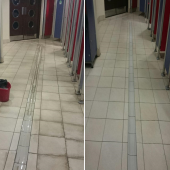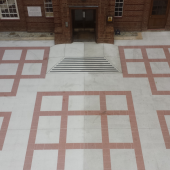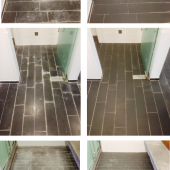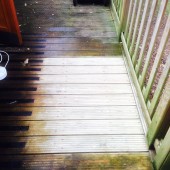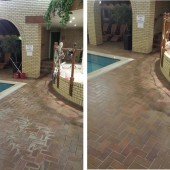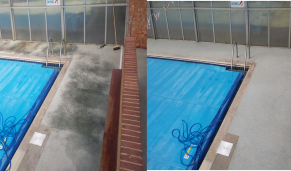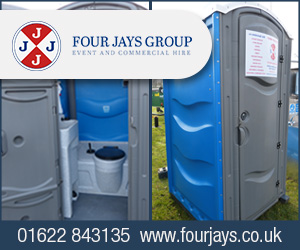Address
Brown Oaks Barns
Alresford Road
Alresford Road
Colchester
Essex
CO7 9JZ
England UK
About Sliptech
Slips and trips are the most common cause of major accidents both at work and in public spaces, costing businesses and local authorities more than £512 million per year in compensation and legal fees.
Slip Testing
Using the British Pendulum Tester recommended by the HSE and UK Slip Resistance Group to the British Standard 7976. We offer a comprehensive slip testing service including a full report detailing methods and results. If the floor does not meet regulations we can produce a tailor-made schedule of treatment which upon completion will ensure the floor will meet required standards.
Current Construction Legislation and the Pendulum Slip Test
CE Marking Legislation
Since 1st July 2013, the new Construction Products Regulation (305/2011/EU) came into force making it mandatory for construction products in the UK (and the rest of Europe) to be CE marked. The new Construction Products Regulation (CPR) applies to products or kits which are placed on the market for incorporation in a permanent manner in construction works and the performance of which, has an effect on the basic requirements of the works.
The new regulation is completely different to other CE Marking Legislations and requires the product to be assessed against a harmonised standard, which in the case of flooring, is the pendulum slip test.
The pendulum slip test is designed to replicate a pedestrian heel strike, the point at which most slips occur. When a pedestrian heel strikes a wet floor, a fluid film is created between them, which can cause a slip. This test works in wet conditions because it generates a similar fluid film between the slider and the floor.
It can be used to accurately test the slip potential on clean and dry or contaminated floors. This is HSE's preferred method of testing, because it is portable and works in the conditions that slip accidents occur.
Our slip resistance tests are carried out using the Stanley Munroe Pendulum Slip Meter in accordance with BS7976 and EN 14231. Results are correlated against the guidelines issued by The UK Slip Resistance Group and the HSE.
Anti-Slip Floor Treatments
Our anti-slip treatment micro-etches the surface of the tile which works to accentuate the natural peaks and troughs of the stone. The changes to the surface of the stone are invisible to the human eye but the treatment microscopically roughens the surface increasing the slip resistance and preventing the foot slipping.
We have worked with a wide range of sectors throughout the UK including hotels, leisure facilities, pubs, clubs, bars, restaurants, swimming pools and hospitals.
The aim of the treatment is to achieve the maximum grip with the minimum impact to the aesthetics of the floor. Varying characteristics of different floors, (porosity, density etc.) combined with the operational use mean that every requirement is different therefore adjustments can be made to the treatment to meet the standards for the intended use. The objective is to achieve the maximum grip with the minimum impact to the aesthetics of the floor ensuring the surface meets the unique specifications of the project in terms of the required pendulum scale reading taking into account the conditions (wet or dry) and any unique external factors.
Our non slip floor treatments can be applied quickly and easily and require no drying or curing so providing a quick safe convenient solution for those times where minimising “downtime” is essential.
We offer a fully guaranteed service and reports and certificates are supplied on completion of any project.
Specialist Builders' and Sparkle Clean
As major construction projects move towards completion, the final push towards hand-over high-lights a large number of outstanding, unresolved issues and many of them are with regard to the final finish and general look of the premises.
By its very nature the building process will always leave behind a lot of dust, grout residue, paint, silicon and general building dirt which needs to be cleaned off, especially from floor surfaces.
These are difficult to remove completely using conventional methods. The general result is that residues are left on the surfaces, which in turn quickly attract contaminants and leave areas looking dirty and unsightly.
By using a range of specialist cleaning products, techniques and machinery we can completely remove these residues ensuring that the area looks pristine for the hand over, while leaving a clean and maintainable floor for the client.
Where required, we can offer the client onward maintenance guidelines as well as slip testing to certify the floors are safe and ready for use.
Slip Testing
Using the British Pendulum Tester recommended by the HSE and UK Slip Resistance Group to the British Standard 7976. We offer a comprehensive slip testing service including a full report detailing methods and results. If the floor does not meet regulations we can produce a tailor-made schedule of treatment which upon completion will ensure the floor will meet required standards.
Current Construction Legislation and the Pendulum Slip Test
CE Marking Legislation
Since 1st July 2013, the new Construction Products Regulation (305/2011/EU) came into force making it mandatory for construction products in the UK (and the rest of Europe) to be CE marked. The new Construction Products Regulation (CPR) applies to products or kits which are placed on the market for incorporation in a permanent manner in construction works and the performance of which, has an effect on the basic requirements of the works.
The new regulation is completely different to other CE Marking Legislations and requires the product to be assessed against a harmonised standard, which in the case of flooring, is the pendulum slip test.
The pendulum slip test is designed to replicate a pedestrian heel strike, the point at which most slips occur. When a pedestrian heel strikes a wet floor, a fluid film is created between them, which can cause a slip. This test works in wet conditions because it generates a similar fluid film between the slider and the floor.
It can be used to accurately test the slip potential on clean and dry or contaminated floors. This is HSE's preferred method of testing, because it is portable and works in the conditions that slip accidents occur.
Our slip resistance tests are carried out using the Stanley Munroe Pendulum Slip Meter in accordance with BS7976 and EN 14231. Results are correlated against the guidelines issued by The UK Slip Resistance Group and the HSE.
Anti-Slip Floor Treatments
Our anti-slip treatment micro-etches the surface of the tile which works to accentuate the natural peaks and troughs of the stone. The changes to the surface of the stone are invisible to the human eye but the treatment microscopically roughens the surface increasing the slip resistance and preventing the foot slipping.
We have worked with a wide range of sectors throughout the UK including hotels, leisure facilities, pubs, clubs, bars, restaurants, swimming pools and hospitals.
The aim of the treatment is to achieve the maximum grip with the minimum impact to the aesthetics of the floor. Varying characteristics of different floors, (porosity, density etc.) combined with the operational use mean that every requirement is different therefore adjustments can be made to the treatment to meet the standards for the intended use. The objective is to achieve the maximum grip with the minimum impact to the aesthetics of the floor ensuring the surface meets the unique specifications of the project in terms of the required pendulum scale reading taking into account the conditions (wet or dry) and any unique external factors.
Our non slip floor treatments can be applied quickly and easily and require no drying or curing so providing a quick safe convenient solution for those times where minimising “downtime” is essential.
We offer a fully guaranteed service and reports and certificates are supplied on completion of any project.
Specialist Builders' and Sparkle Clean
As major construction projects move towards completion, the final push towards hand-over high-lights a large number of outstanding, unresolved issues and many of them are with regard to the final finish and general look of the premises.
By its very nature the building process will always leave behind a lot of dust, grout residue, paint, silicon and general building dirt which needs to be cleaned off, especially from floor surfaces.
These are difficult to remove completely using conventional methods. The general result is that residues are left on the surfaces, which in turn quickly attract contaminants and leave areas looking dirty and unsightly.
By using a range of specialist cleaning products, techniques and machinery we can completely remove these residues ensuring that the area looks pristine for the hand over, while leaving a clean and maintainable floor for the client.
Where required, we can offer the client onward maintenance guidelines as well as slip testing to certify the floors are safe and ready for use.
 UK
UK Ireland
Ireland Scotland
Scotland London
London


